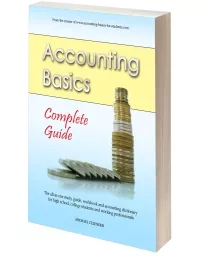Basic Accounting Quiz:
Asset and Liability Balance Sheet Categories
by Muneeb
(Pakistan)
Before you begin: For purposes of testing and exams it's important to make sure you not only answer correctly but also do so at the right speed. So, when attempting this quiz, use a watch or clock to time yourself.
Difficulty Rating:
Beginner --> Intermediate
Time limit:
8 minutes
Q: Sir, which balance sheet categories do the following belong to:
1. Bank overdraft,
2. Mortgage,
3. Fixture,
4. Inventory,
5. Horse and cart,
6. Allowance for bad debt,
7. Investment 5% securities,
8. Premises,
9. Plant
A: Hi Muneeb,
This is actually a great basic accounting quiz which can also help you practice where to put different items in the the balance sheet.
Here are my answers followed by brief explanations:
1. Bank overdraft - A bank overdraft is when your bank account goes into the negative. Instead of having money in the bank, you actually have a negative balance. This means you actually owe money to the bank. So this is a liability.
The question then becomes, "Is this a non-current or current liability?" And the answer is that this is a current liability, because we expect to pay the bank within less than a year from the date of the balance sheet.
 2. Mortgage - A mortgage is a loan from a bank to fund a property (house, factory, apartment, etc.). The loan is backed by the property's value - in other words, if you don't pay, the bank takes the property.
2. Mortgage - A mortgage is a loan from a bank to fund a property (house, factory, apartment, etc.). The loan is backed by the property's value - in other words, if you don't pay, the bank takes the property. A mortgage is a long-term loan, so this falls under a non-current liability.
 3. Fixture - A fixture is some sort of ornament or fittings or equipment permanently fitted inside a property.
3. Fixture - A fixture is some sort of ornament or fittings or equipment permanently fitted inside a property. This is an asset which we expect to bring us benefits for a long time. As such, it's a non-current asset.
4. Inventory - Inventory are stock or goods that you sell. Since we expect to sell it quite often, definitely in less than a year, it is classified as a current asset.
5. Horse and cart - This is an unusual one, but anyway. Let's assume the business has a horse and cart which it uses
6. Allowance for bad debt - This is a tricky one. The allowance for bad debts, also known as the provision for bad debts or provision for doubtful debts, is the portion of debts owed to us (debtors) that we expect will not pay us in the future. It is actually the negative part of debtors or accounts receivable.
The allowance for bad debts is not shown as a separate line item in the balance sheet. Instead, it is included in in the calculation of Trade and Other Receivables (also known as Trade and Other Debtors). Trade and Other Receivables is the total of short-term debts owed to us and is classified as a current asset.
The allowance for bad debts would be classified as the negative part of the Trade and Other Receivables current asset.
7. Investment 5% securities - Investments, also known as Other Financial Assets, are long-term assets for a business. As such, they are usually classified as non-current assets. However, if the business has an investment that it intends to sell in less than a year from the balance sheet date, that investment is counted as a current asset.
 8. Premises - Premises are the property where you do business - offices or a factory. This is a long-term asset and so is classified as a non-current asset in the balance sheet.
8. Premises - Premises are the property where you do business - offices or a factory. This is a long-term asset and so is classified as a non-current asset in the balance sheet.9. Plant - Plant is similar to premises. It's a general word that means the land, buildings, equipment and machinery of a factory or business. Just like premises, it is classified as a non-current asset.
Hope this basic accounting quiz helped you practice your classification of assets and liabilities and made it a bit easier to put together the balance sheet!
All the best in your studies!
Best,
Michael Celender
Related Questions & Tutorials:
- Basic Accounting Quiz: Capital Expenditure vs Revenue in Nature
- What are Assets? Tutorial
- What are Liabilities? Tutorial
- Bad Debts, Provision for Bad Debts, Debtors Control
- Why is the Provision for Doubtful Debts a Liability?
Return from Basic Accounting Quiz to our main Balance Sheet Tutorial
Click here for more free Basic Accounting Questions
Comments for Basic Accounting Quiz:
|
||
|
||
© Copyright 2009-2021 Michael Celender. All Rights Reserved.
Click here for Privacy Policy.



